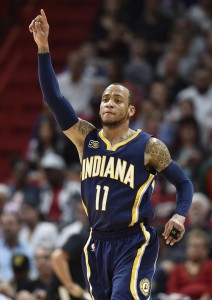It has been nearly a month since the NBA’s trade deadline passed, but we’ve still seen a flurry of transactional activity during the last four weeks, as teams have signed and waived players ahead of the postseason.
While some clubs have full rosters and seem unlikely to make any changes between now and the end of the regular season, that’s certainly not the case across the board.
With the help of our roster counts tracker, here’s our latest look at open roster spots around the league, as of April 22:
Teams with one or more open 15-man roster spots:
- Golden State Warriors
- Miami Heat
- Minnesota Timberwolves
- New Orleans Pelicans (2)
- New York Knicks
- Portland Trail Blazers
- San Antonio Spurs
The Heat, Timberwolves, Knicks, and Spurs each have 14 players on standard contracts and one opening on their 15-man rosters. They’re all good bets to sign a 15th man before the season ends, either for developmental purposes or for added postseason depth.
The Warriors and Trail Blazers have 13 players apiece on standard deals, one on a 10-day contract – Gary Payton II for Golden State and Rondae Hollis-Jefferson for Portland – and one open spot. Hollis-Jefferson’s 10-day pact runs through next Tuesday, while Payton’s goes through Wednesday. Once those deals expire, the Warriors and Blazers will each have up to two weeks to get back to 14 players.
Since the NBA only allows teams to dip to 13 or fewer players for up to two weeks at a time, the Pelicans are very much on the clock. They’ve been at 13 players for the last nine days, since Isaiah Thomas‘ 10-day contract expired. The expectation is that New Orleans will sign draft-and-stash prospect Didi Louzada as a 14th man by early next week.
Teams whose 15-man rosters are full due to one or more 10-day contracts:
- Cleveland Cavaliers (Mfiondu Kabengele)
- Denver Nuggets (Austin Rivers)
- Los Angeles Clippers (DeMarcus Cousins; Yogi Ferrell)
- Memphis Grizzlies (Tim Frazier)
- Oklahoma City Thunder (Justin Robinson)
- Orlando Magic (Donta Hall; Robert Franks)
- Philadelphia 76ers (Anthony Tolliver)
- Sacramento Kings (Damian Jones)
- Toronto Raptors (Freddie Gillespie)
- Washington Wizards (Jordan Bell)
These 10 teams have full 15-man rosters as of today, but that might not last long. The dozen 10-day contracts listed here will begin expiring as soon as tonight (Hall), so if those players aren’t re-signed, the clubs will have roster openings.
The Nets will also fall into this group once they officially waive LaMarcus Aldridge and sign Mike James to a 10-day deal.
Teams with an open two-way contract slot:
- Cleveland Cavaliers
- Minnesota Timberwolves
- Phoenix Suns
- Toronto Raptors
The Suns have only carried a single two-way player all season long, so there’s no guarantee they’ll fill their second slot before the end of the regular season.
The other teams listed here are all better candidates to do so — Cleveland (Lamar Stevens) and Toronto (Yuta Watanabe) just recently promoted two-way players to their respective 15-man rosters, while Minnesota was carrying a pair of two-way players until waiving Ashton Hagans in February.
The Cavs reportedly intend to sign Jeremiah Martin to fill their two-way opening.
 In some cases, teams are carrying cap hits for players whom they released several years ago. That’s the case in Indiana, for instance, where the Pacers have a $2,245,400 cap charge for
In some cases, teams are carrying cap hits for players whom they released several years ago. That’s the case in Indiana, for instance, where the Pacers have a $2,245,400 cap charge for